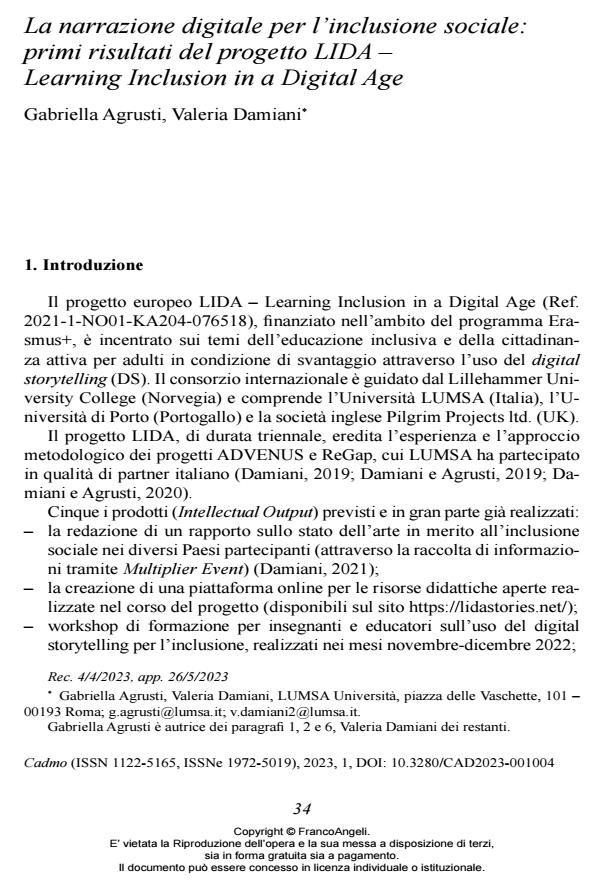Digital storytelling for social inclu- sion: first results of the LIDA project - Learning Inclusion in a Digital Age
Journal title CADMO
Author/s Gabriella Agrusti, Valeria Damiani
Publishing Year 2023 Issue 2023/1
Language Italian Pages 16 P. 34-49 File size 211 KB
DOI 10.3280/CAD2023-001004
DOI is like a bar code for intellectual property: to have more infomation
click here
Below, you can see the article first page
If you want to buy this article in PDF format, you can do it, following the instructions to buy download credits

FrancoAngeli is member of Publishers International Linking Association, Inc (PILA), a not-for-profit association which run the CrossRef service enabling links to and from online scholarly content.
The European project LIDA Learning Inclusion in a Digital Age (Ref. 20211NO01KA204076518), funded under the Erasmus+ programme, addressed the topics of inclusive education and active citizenship for dis- advantaged adults through the use of digital storytelling. This article pre- sents the evaluation process of the LIDA digital resources realized during the training workshops for teachers and educators on the use of digital storytell- ing, which involved a variety of target groups (economically disadvantaged adults, migrants, students). The results highlighted the powerful potentials of digital storytelling in education and laid the groundwork for a more ex- tensive use of such approach with the aim of fostering social cohesion and ultimately promoting the inclusion of vulnerable individuals.
Keywords: digital storytelling, social inclusion, migrants, refugees, vulnerable people.
- Agrusti, G., Damiani, V. (2019), “The ReGap project: online and blended resources to foster social inclusion for migrants and refugees”, Cadmo. Giornale italiano di pedagogia sperimentale – An International journal of educational research, 27, 1, pp. 119-122.
- Alkin, M.C., Vo, A.T. (2018), Evaluation Essentials. From A to Z. New York: The Guilford Press.
- Bradley, R.H., Corwyn, R.F. (2002), “Socioeconomic status and child development”, Annual Review of Psychology, 53, pp. 371-399.
- Bruner, J.S. (1992), La ricerca del significato. Per una pedagogia culturale. Torino: Bollati Boringhieri.
- Clark, M., Ausloos, C.D., Delaney, C., Waters, L., Salpietro, L., Tippett, H. (2020), “Best Practices for Counseling Clients Experiencing Poverty: A Grounded The- ory”, Journal of Counseling & Development, 98, pp. 283294.
- Damiani, V. (2019), “Words for inclusion: Research experience and perspectives on the creation of online L2 resources for migrants and refugees in Italy”, Inter- national Journal of Inclusive Education, 1, pp. 4051, DOI: 10.1080/13603116.2019.1673958
- Damiani, V. (2021), “Dare voce agli adulti in situazione di svantaggio: il progetto LIDA per l’inclusione sociale di migranti e rifugiati”, Cadmo. Giornale italiano di pedagogia sperimentale – An International journal of educational research, 29, 2, pp. 57-69.
- Damiani, V., Agrusti, G. (2020), “Promuovere l’inclusione di migranti e rifugiati at- traverso risorse e-learning e attività in presenza: un’esperienza sul campo in Ita- lia”, Italian Journal of Educational Technology, 3, pp. 210226,
- Dunford, M., Jenkins, T. (2017), Digital storytelling: form and content. London: Palgrave Macmillan.
- Fields, A., Diaz, K. (2008), Fostering Community through Digital Storytelling: A Guide for Academic Libraries. Westport: Libraries Unlimited.
- Freire, P. (2000), Pedagogy of the Oppressed (30th anniversary ed.). New York: Bloomsbury.
- Galkienė, A., Monkevičienė, O. (2021), Improving Inclusive Education through Universal Design for Learning. Cham: Springer.
- GregoriSignes, C., BrígidoCorachán, A.M. (2014), Appraising Digital Storytelling across Educational Contexts. Valencia: Universitat de Valencia.
- Haigh, C., Hardy, P. (2018), Using digital stories in healthcare research: ethical and practical dilemmas. In C. Costa, J. Condie (Eds), Doing research in and on the digital: Research methods across fields on inquiry. London: Routledge.
- Hardy, P., Sumner, T. (2014), Our stories, ourselves: exploring identities, sharing experiences and building relationships through Patient Voices. In H. Pleasants, D. Salter (Eds), Community-Based Multiliteracies and Digital Media Projects: Questioning Assumptions and Exploring Realities. New York: Peter Lang.
- Hardy, P., Sumner, T. (2018), Cultivating compassion: How Digital Storytelling is Transforming Healthcare. London: Palgrave Macmillan.
- Jamissen, G., Hardy, P., Nordkvelle, Y., Pleasants, H. (2017), Digital storytelling in higher education: International perspectives. London: Palgrave Macmillan.
- Lambert, J. (2018), Digital storytelling: Capturing lives, creating community. Lon- don: Routledge.
- Mani A, Mullainathan, S., Shafir, E., Zhao, J. (2014), “Poverty impedes cogniti- ve function”, Science, 341, 6149, pp. 976980,
- McLoyd, V.C. (1998), “Socioeconomic disadvantage and child development”, Ame- rican Psychologist, 53, 2, pp. 185204.
- Ohler, J. (2008), Digital storytelling in the classroom: New media pathways to lite- racy, learning and creativity. London: Corwin Press.
- Sassen, S. (1999), Guests and Aliens. New York: The New Press.
- Stake, R.E. (2011), “Program evaluation particularly responsive evaluation”, Journal of Multidisciplinary Evaluation, 7, 15, pp. 180-201.
- Stufflebeam, D.L., Coryn, C.L.S. (2011), Evaluation Theory, Models, & Applica- tions. London-New York: Josey-Bass.
- Trinchero, R. (2002), Manuale di ricerca educativa. Milano: FrancoAngeli.
- UN DESA/Project Office on Governance (201920), Training toolkit on government innovation for vulnerable groups, https://unpan.un.org/node/585.
- UN/DESA (2017), Report on the World Social Situation, -- https://documents-dds-ny.un.org/doc/UNDOC/GEN/N17/229/64/PDF/N1722964.pdf?OpenElement.
- Yballe, L., O’Connor, D. (2000), “Appreciative Pedagogy: Constructing Positive Models for Learning”, Journal of Management Education, 24, 4, pp. 474483
Gabriella Agrusti, Valeria Damiani, La narrazione digitale per l’inclusione sociale: primi risultati del progetto LIDA - Learning Inclusion in a Digital Age in "CADMO" 1/2023, pp 34-49, DOI: 10.3280/CAD2023-001004